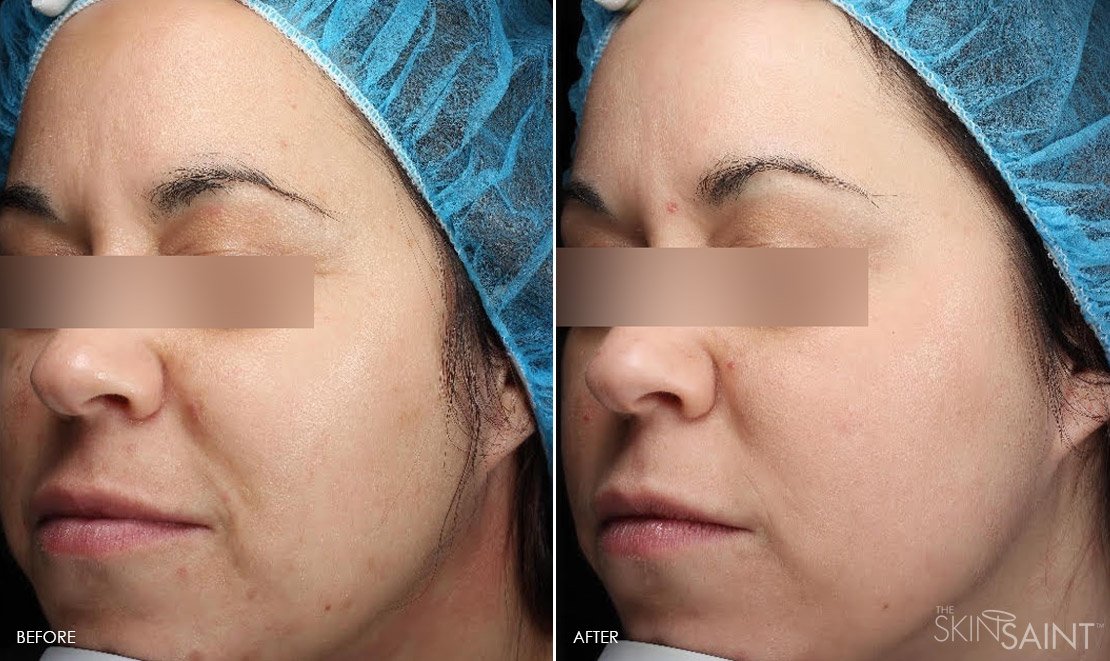Hydrating vs. Moisturizing
Do you know how to pick the right moisturizer for your skin type? If not, keep reading!
There are three main types of ingredients used in moisturizers:
- Humectants draw water into the skin, leaving it dewy, plump, radiant and glowing. You want these in your moisturizer regardless of skin type! Look for ingredients like Hyaluronic Acid, Sodium PCA or Glycerin.
- Emollients soften and condition your skin while eliminating dryness and flakiness. These are essential for most skin types, ESPECIALLY dry skin as they provide oil to the skin. Look for ceramides, lipids, fatty acids, cholesterol and shea butter.
- Occlusives seal everything into the skin. Very dry skin, chronic skin conditions or post‑laser treatment skin needs occlusives. Look for ingredients like dimethicone, squalene or petroleum jelly to keep the moisture in your skin.
If you need more help figuring out what the right ingredients for you are, send me a DM or book a virtual consultation at theskinsaint.com!
Skincare for Different Demographics
Different skin types need different care, and that extends to age, gender, and ethnicity as well. Your skin’s needs evolve over time.
For instance, people in their 20s should focus on prevention, like sunscreen and antioxidants. As you hit your 30s and 40s, collagen production starts to slow, so incorporating ingredients like retinoids and peptides becomes more important.
Gender plays a role too. Men tend to have thicker skin with more oil production, so their skincare needs will differ from women. Gender-specific skincare products can address these differences effectively.
Ethnicity can also influence how your skin responds to certain products or treatments. For example, darker skin tones may be more prone to hyperpigmentation, requiring special care when using lasers or chemical peels.
How to Read Skincare Labels
Now that you know what to look for in your skincare, you should probably know how to read the labels!
Remember how we talked about humectants above? Those will be at the top of the label ‑ ingredients like water and glycerine.
Next up are actives. For the most part, you want these HIGH up in the list so you know the product contains a lot of them, which will make it more effective when treating your skin. These are the ingredients that give your skincare products it’s “characteristics” and help treat your skin.
On the other hand, other very potent actives are best at 1% like retinoids, so this might not always be the case.
Take a look at some of my other videos and guides to learn the best ingredients for your skin type and skin goals, so you know what to look for on these labels. You want to use the RIGHT products for you!
P.S. To make things even easier, we have The Skin Saint products grouped by skin type on our website to take out the guesswork!
Product Education and Ingredients Breakdown
Understanding what goes into your skincare products is crucial. Not all ingredients work for every skin type, and some can even do more harm than good.
Start by familiarizing yourself with common active ingredients. For acne-prone skin, salicylic acid and benzoyl peroxide are great options. If you’re focused on anti-aging, look for retinoids and peptides to boost collagen production.
Be cautious of harsh chemicals, especially if you have sensitive skin. Fragrances and alcohol can often cause irritation. Stick to products with fewer, but more effective, ingredients.
When choosing products, pay attention to where the active ingredients are listed on the label. The higher they appear on the list, the more concentrated they are in the formula.
Combat Free Radicals
Are you familiar with free radicals? Unfortunately, your skin is!
Free radicals are the enemy of beauty. They’re unstable molecules that steal electrons from your cells that cause them to malfunction. Sounds kind of scary!
You can expect to see things like:
- Brown spots
- Fine lines & wrinkles
- Sagging skin
- Faster aging
- Lack of elasticity
…all the things we work so hard to avoid! So, what can you do?
Use Topical antioxidants like niacinamide, Vitamin C, Vitamin E and Ferulic Acid, all of which are found in my CEF+ Peptide Serum! You can also try out my Amplify AH Serum, which combats damage from the environment, cell phones and computers.
Most importantly, use these DAILY ‑ and start when you’re young! You’ll thank me later.
Technological Advancements in Skincare
Skincare technology has come a long way. Tools like AI-powered skin analysis and diagnostic devices help pinpoint exactly what your skin needs.
For instance, some clinics use handheld devices to scan your skin and determine which products work best for your specific concerns. These tools analyze things like hydration levels, pore size, and pigmentation.
Technology also extends to at-home gadgets. From LED light therapy to microcurrent devices, these innovations allow you to improve your skin from the comfort of home. They’re a great supplement to a solid skincare routine.
Even in-office treatments, such as lasers and chemical peels, rely on advanced technology to deliver better results with less downtime. These methods help target deeper layers of the skin, promoting collagen production and skin rejuvenation.
IV Nutrient Therapy
As you know, I’m big on holistic healthcare, treating your body from the inside AND the outside.
That’s why I LOVE to get regular nutrient IVs from @cutlerintegrativemedicine! I’m not crazy about the poke, but I love feeling healthy and rejuvenated after my IV session.
One of my FAVORITES is the Cutler Guarantee IV, which has 17 nutrients handpicked to treat all aspects of your health, including anti‑aging, energy, hydration, immune system, metabolism, stress relief and more!
So, when you visit us at FACE, make sure to spare a little extra time to get a nutrient IV, you won’t regret it!
Skincare from the Inside Out
What you put in your body affects your skin just as much as what you apply on it. Your diet, hormones, and nutrient levels all play a big role in skin health.
For example, deficiencies in vitamins like A, C, and E can lead to dull, dry skin. Omega-3 fatty acids help keep your skin hydrated and supple. Including these nutrients in your diet can improve your skin from within.
Hormones also impact skin. Imbalances can cause acne, dryness, or even early signs of aging. Keeping your hormones in check through proper diet, exercise, and stress management can make a noticeable difference.
Nutrient therapies, like IV drips, are becoming popular for delivering essential vitamins directly into your system. These therapies are designed to boost your overall health, which reflects in your skin’s appearance.








